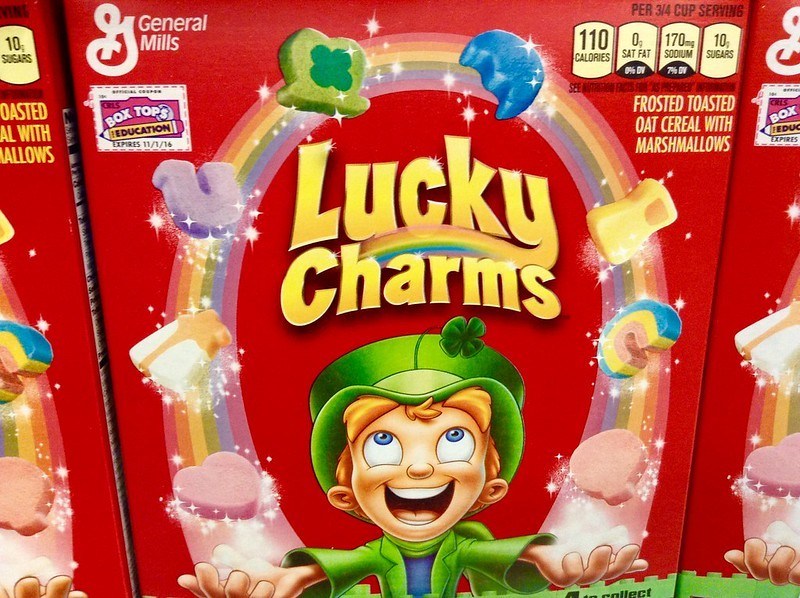
Photograph Source: Mike Mozart – CC BY 2.0
Fear not, white people. Black people won’t eat you.
If they were to not be disproportionately killed by police and locked up in prison for things that you’d get a slap on the wrist for, it wouldn’t hurt you.
The resistance to black justice is clearly widespread, with even some terrorist acts against protesters in recent days. Various memes have also come out trying to negate the struggle for black justice’s legitimacy. In particular, there has been a meme floating around claiming that Irish people are not “over-sensitive little bitches” who don’t complain about the Leprechaun image on Lucky Charms cereal boxes.
To some, Leprechauns may evoke images of Irish as barbaric, uncivilized and prone to violence in the US during the 19th century and early 20th century, as well as similar British and Anglo-Irish depictions of the Irish during the British colonial period.
Historically, the origin of the Leprechaun myth is a little vague. On a tour I took in Southwest Irelands over a decade ago, the guide maintained that Leprechaun myth derived from the Celtic people in Hibernia. According to the guide, the Celts were guilt-ridden over their liquification of the native Hibernians approximately two millennia ago and repurposed their memory into myth. More generally, though, they seem to have more in common with tricksters that are found universally throughout mythology.
The experience of the Irish in America is nothing like what African Americans have experienced over the past 400 years. The Irish in America, like the Chinese, Jews, Italians, and today like Muslim and Hispanic immigrants, were historically excluded and discriminated against by various levels of government, the Know-Nothing party and civilians alike.
However, the immigrant experience pales in comparison to the systemic 350-plus years of extraordinary injustice that blacks have encountered.
It starts with well over 200 years of chattel slavery, where African Americans were treated no better than the horses used for transport. After emancipation during the Jim Crow period, blacks experienced lynching, overt voter suppression, minimal suffrage rights, educational and housing discrimination, which included the deliberate underfunding of segregated black schools and the widescale prevention of African American homeownership. During the post-Civil Rights era, injustice continues with the systemic underfunding of schools that blacks attend, unequal treatment by police, the courts and the law, in addition to continued voter suppression with the stripping of much of the 1965 Voters Rights Act.
While whites from the working and lower middle class may feel elevated by having the dubious privilege of being able looking down on a more underprivileged people, solidarity would be the more obvious answer. The current neoliberal system does not work for either group, from the outsourcing and automating of jobs affecting all Americans, to the institutional racism of blacks. Therefore, it would make sense for whites who feel in a state of precarity, not to fight against a far more underprivileged group’s equality, but to fight the system that makes them unequal and precarious.
Irish Americans, whose ancestors faced centuries of injustice under the British Empire, and not a small amount of discrimination in the US, should, particularly, feel a natural solidarity with African Americans. They need look no further than history for examples, from Irish indentured servants’ involvement in African slave revolts, Frederick Douglas’s warm reception in Ireland by Daniel O’Connell and other Irish nationalists in 1845, to black Harlem’s support of the Easter Rebellion, to the 1990s performance of the musical Riverdance that highlighted the Irish-black solidarity of historically oppressed people.
And we must not forget that the Irish people did “bitch” several times by rising up against their oppressor, Great Britain, before much of the island finally won its freedom in the 1920s. They “bitched” again, by protesting injustice and inequality in Northern Ireland, setting off the Troubles period.
So, to my fellow Irish Americans, know your history and drop the ludicrous anti-black justice Leprechaun memes. Strongly consider supporting the full equality of African Americans. Just as your ancestors found solidarity with the black struggle for liberation and fought against oppression, it’s now on your turn to support justice for all, in allying with Black Lives Matter.